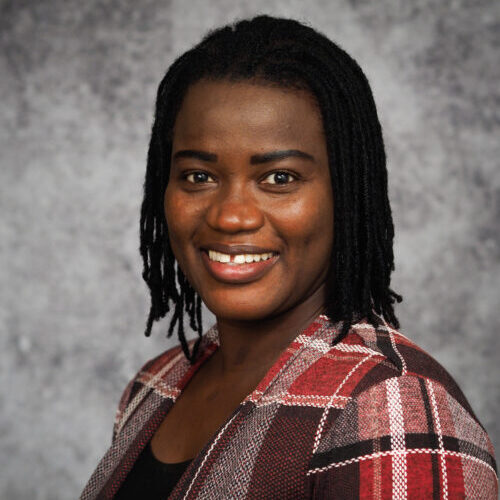Haddy Njie

Bio
Dr. Njie is a native of The Gambia, West Africa, and a graduate of the University of The Gambia with a Bachelor’s degree in History. She is also a graduate of Ohio University with a Master’s degree in International Studies and a graduate of Florida State University with a Ph.D. in Sociocultural and International Development Education Studies.
Extension and Community Engagement
She is a board member of Africa Yes, a not-for-profit international development organization in Durham, North Carolina. The organization provides support to communities in Sierra Leone, West Africa, in the areas of health, women’s economic empowerment and education.
Research Publications
Njie, H. (2022). Community Building and Ubuntus: Using Osusu in the Kangbeng-Kafoo Women’s Group in The Gambia. In Shenaz, C. H & Pj, C (Eds.), Community Economies in The Global South: Case Studies About Rotating Savings and Credit Associations and Economic Cooperatives. Oxford University Press.
Njie, H., Saiba, S., & Cherno, B. (2019). “Teacher Education in The Gambia: Successes, Challenges, and Future Prospects. In Karras, K.G & Wolhuter, C.C. (Eds), International Handbook of Teacher Education Worldwide, Vol. 1- ISBN: 978-9963-2415-5-2
Manion, C., & Njie, H. (2017). Understanding The Gambia Success Story in Girls’ Education: Enabling Factors and Remaining Challenges In Brown, E and Zong, E (Eds.), Global Perspectives on Gender and Sexuality in Education: Raising Awareness, Fostering Equity, Advancing Justice (pp. 61-84). Scotdale, Arizona: Information Age Publishing, Inc
Njie, H. (2016). The Interaction of Economic Livelihood Strategies and Literacy and Numeracy Practices of Urban Gambian Women with Low Educational Attainments. International Journal of Education and Literacy Studies, 4(3), 73-87.
Njie, H., Manion, C., & Badjie, M. (2015). Girls’ Familial Responsibilities and Schooling in The Gambia. International Education Studies, 8 (10), 48.
Presentations
Njie, H. (2018). Feeding students into and through the secondary school pipeline while underprepared: The crises of student learning in Gambian schools. Paper presented at the 62nd Comparative International Education Society Conference in Mexico City, Mexico, March 25-29.
Njie, H (2018). Local Response to Poverty Alleviation: ‘Osusu’ as a Form of Peri-Urban Gambian Women’s Valued Capability. Paper presented at the 60th, African Studies Meeting in Chicago, Illinois, November 16-18.
Njie, H. (2016). The ‘Feminization’ of Women’s Incomes in Sub-Saharan Africa and Implications for the UN’s Sustainable Development Goals. Paper presented on March 23rd, at the North Carolina State University International Studies Fall Colloquium.
Njie, H (2016). Global Literacy in the Social Media Practices of Dropout Gambian Youth: Implications for Second Chance Schooling. Paper presented at the 60th Comparative International Education Society Conference in Vancouver, Canada, March 6-10.
Njie, H. (2014). Women and Poverty in Sub-Saharan Africa: A case Study in Gambian Issues. Paper presented on October 30th, at a public lecture at Lenoir-Rhyne University.
Njie, H. (2014). Out-of-School Factors in Low Literacy Acquisition, Uses, and Retention Among Female School Dropouts in The Gambia. Paper presented at the Comparative International Education Society Midwestern Regional Conference in Bloomington, IN, October 10-12.
Njie, H. (2013). “Acquisition and Use of Literacy by Women School Leavers in Peri-urban Areas of Banjul: The Interaction of Gender Roles, Livelihoods, and Community Responsibilities.” Paper presented at the Comparative International Education Society Southeast Conference in Tallahassee, FL, October 11-13.
Easton, P., and Njie, H. (2013). Trajectories of Male School Dropouts in Gambia, West Africa. Paper presented at the Comparative International Education Society Southeast Conference in Tallahassee, FL, October 11-13.
Njie, H. (2012). The Gambia Educational Policy 2004-2015: Strengths and Loopholes in Scaling up of Girls’ Secondary Schooling. Paper Presented at the University of Pittsburgh, Institute for International Studies in Education. October 28-29.
Njie, H. (panel organizer) (2011). Comparing educational equity issues in Indonesia, the Middle East, and West Africa: Gender and locational disparities. 55th Comparative International Education Society Conference in Montreal, Canada, May 1-5, 2011.
Njie, H. (2011). The Effects of Global Transfer of Knowledge on Education in Developing Countries. Paper presented at the Sixth Annual Conference of the International Education Program, Steinhardt School of Culture, and Education & Human Development. New York University, March 25-26.
Area(s) of Expertise
Her research interest, broadly defined, is in gender and development in Sub-Saharan Africa. She is primarily interested in girls' education, women's local uses of literacies, women and informality, gender and household resource management and women's social capital and money clubs. Each of those topics figured prominently in her ethnographic work, which culminated in her dissertation which analyzed the interaction between the gender roles of urban Gambian women with low educational qualifications and their literacy practices.
Additionally, teaching courses in International Studies allow for the integration of her research interest in other topics within the larger spectrum of globalization issues and debates.